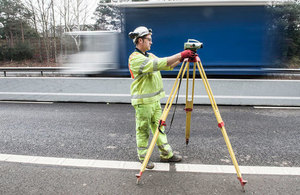Overnight workers keep the East Midlands moving
Most of Highways England’s roadworks are done overnight. More than 1 million hours worked overnight in last 12 months alone

As the clocks go back and dark nights loom, Highways England is hoping to shed some light on the way it works in the East Midlands.
A small army of staff from Highways England and our contractors work around the clock to keep our major motorways and A-roads flowing – and we’ve clocked up more than 1 million hours of overnight work in the region in the past year alone.
Now a new video has been produced, giving a flavour of some of the overnight work carried out by Highways England.
Highways England’s Midlands Regional Director, Tim Harbot, explained:
There are hundreds of staff working for Highways England through the night in the Midlands to help meet the challenge of running some of the busiest motorways in the country.
This invisible army of road workers, traffic officers and control centre staff work through the darkness to deal with incidents, repairs and maintenance. Their dedication helps to keep drivers moving throughout the Midlands.
With £1.8 billion to invest in roads across the Midlands in the next five years, and lots of activity planned to deliver huge improvements to journeys across the region, Highways England is hoping to help drivers to better understand why we work at night.
Andy Jackson is a site manager for A-one+, Highways England’s main contractor in the East Midlands, and is working on the A1/A46 Winthorpe Interchange at Newark-on-Trent.
He’s just one of the many road workers in the area – and he’s backing the initiative to raise awareness about the amount of work carried out to maintain and improve the region’s roads overnight.
Andy explained:
Night time is the quietest time we can find to do the work, so that we can keep disruption to a minimum, but night working does come with its own challenges: we’re often working in wet and windy conditions, and we have to make sure we get the job done and the road reopened before the morning rush hour begins. That requires dozens of us out on the roads, mostly unseen, so that drivers can wake up to a smoother road surface, ready for use.
Some of the work involves closing a carriageway overnight for safety reasons, but, more often than not, even night time road users are kept on the move, with contractors working in single lanes and hard shoulders and traffic still whizzing by – adding to the hazards presented by the cold and dark.
Andy goes on to say:
It can be dangerous working at night, I see near misses all the time. Just recently, someone drove into our closed-off work area and rammed into the back of one of our vans. That really makes it hit home.
The night-time conditions also mean that road users often cannot see the scale of the work taking place.
Sometimes, people will see a road closure with just a van guarding the entrance to the work area.
They can’t see the rest of the workers. But when we do a road closure, we have to close the road at the most convenient point before the works for the diversion – which could be half a mile or several miles away from the main works. Down the road, there will be 50 or 60 workers, toiling away in near darkness – but people don’t see that.
It’s not rare to have abuse flung at us as drivers pass by. You have to grow a thick skin and get used to it. We know that we’re doing the best we can do and that by carrying out this work overnight – while most people are tucked up in bed – we’re actually causing much less disruption to the travelling public, and that’s always our aim.
Highways England currently has scores of schemes on the ground in the Midlands which utilise overnight shifts.
One example is the Catthorpe Improvement Scheme, where we’re using night shifts as part of the £191 million scheme to improve junction 19 of the M1 motorway and related sections of the M6 motorway and A14 trunk road.
This includes challenging works such as the overnight demolition of an 80-metre motorway bridge earlier this year that weighed in at 2,880 tonnes – more than the Blackpool Tower. You can see footage of this work on the Highways England YouTube channel. Once complete, the Catthorpe scheme will ease congestion and boost safety.
And our commitment to night working doesn’t end with roadworks. Our customer contact centre is staffed around the clock and our Traffic England website gives drivers live traffic information, no matter the time or day.
Our traffic officers patrol motorways around the Midlands through the day and night – and are there to help deal with incidents and keep traffic moving.
Our regional control centre, based at Quinton, Birmingham, has staff monitoring CCTV screens 24/7 and we provide traffic updates to drivers via our website and Twitter feeds, and to keep traffic information services up to speed with the state of our network.
For the latest traffic information, you can visit our website. Alternatively, follow one of Highways England’s Twitter feeds (@HighwaysEMids for the East Midlands) for the latest updates.
General enquiries
Members of the public should contact the Highways England customer contact centre on 0300 123 5000.
Media enquiries
Journalists should contact the Highways England press office on 0844 693 1448 and use the menu to speak to the most appropriate press officer.
The Highways England customer contact centre is available 24/7, 365 days a year. You can get traffic information and enquire about our work by calling 0300 123 5000.